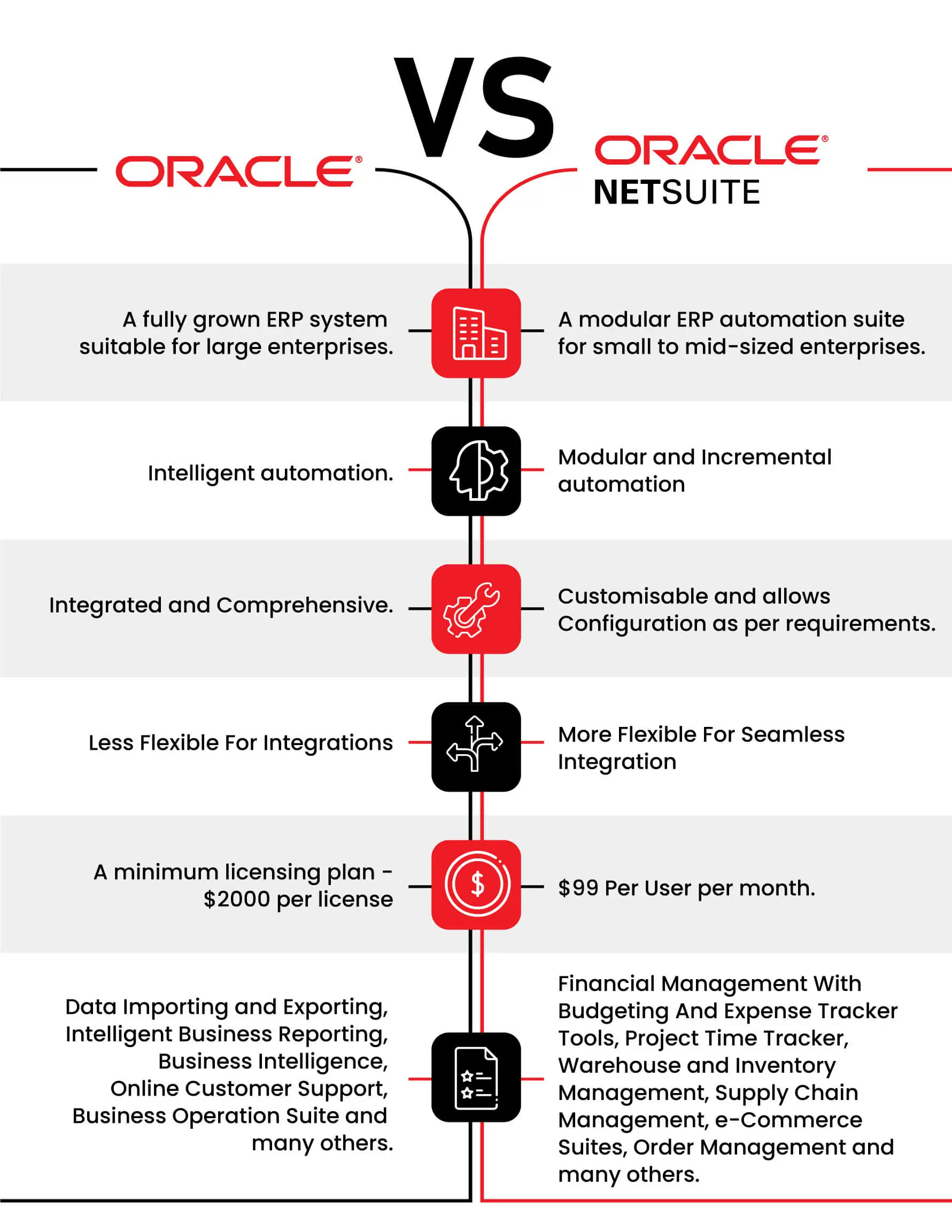Without a doubt, the need for ERP systems is increasing. According to a Gartner survey, about two-thirds of firms either currently use or want to switch to an ERP system within the next three years. Due to this strong demand, businesses have a wide range of options to solve their specific needs.
ERP is a software solution that unifies all divisions within an organization and ensures smooth operation. Oracle, a well-known technology solutions supplier, offers two major ERP platforms: Oracle ERP Fusion and Oracle NetSuite.
If you’re thinking of switching to a new ERP system, compare Oracle Fusion versus Oracle NetSuite. While these two widely used systems have many similarities, there are a few significant differences that need to be considered. Which ERP is better, Oracle Fusion or NetSuite? This blog post will assist you in selecting the system that will work best for your company.
Oracle NetSuite
NetSuite ERP was established in 1998 as a cloud-based ERP system. It specifically serves small and mid-sized enterprises.
Oracle NetSuite provides a wide range of features and capabilities to satisfy the requirements of small businesses. This involves financial data analysis, revenue recognition, inventory management and reporting, online customer service, and many more. One of the key advantages of NetSuite is its scalability, making it suitable for both growing firms and established enterprises.
In 2022, NetSuite was utilized by more than 50% of tech IPOs, Also, 84% of the businesses on the Forbes Cloud 100 list use NetSuite.
NetSuite
Oracle Fusion Cloud ERP
Oracle Corporation developed the Oracle Fusion Cloud ERP system as a part of Oracle Cloud Suite. caters to both small and large enterprises.
Oracle Fusion unifies several Oracle Cloud apps into an integrated solution. It provides a range of features such as finance, procurement, supply chain, human resources, project management, and more. Oracle Fusion gives companies a flexible and customized platform that lets them change their ERP needs as their company expands. Oracle is recognized for its great integration capabilities and range of multiple features.
On the other hand, Oracle Fusion offers more customization and control but at a higher initial cost. Although both Oracle Fusion and NetSuite provide customizable solutions, Oracle Fusion offers a more effective foundation of ERP solutions.
Detailed Comparison of Oracle NetSuite and Oracle Fusion Cloud ERP

1. Features and Functionality
NetSuite specializes in essential ERP functions, including finance, accounting, inventory management, CRM, and e-commerce. It differentiates itself with multi-subsidiary functionality and annual updates.
Oracle Fusion is similarly cloud-based, with a wide range of capabilities that make it ideal for larger integrated businesses. It offers data processing and app features that let you run your company from a single platform. It works well with field service, agent-assisted service, and self-service processes. It automates finance, procurement, supply chain management, and human resources
2. Ease of Use and Implementation
Unlike traditional on-premises solutions, NetSuite runs entirely in the cloud. You can access NetSuite from any location. Firms can work remotely and collaborate in real time using NetSuite’s robust flexibility. Firms can also access their critical financial data on the go.
NetSuite’s intuitive navigation and user-friendly interface also contribute to its professional popularity. With its robust reporting and analytics capabilities, the platform offers a holistic view of financial operations. It has helped enhance visibility and improve decision-making.
With Oracle Fusion ERP, your teams can perform better with role-based dashboards, harmonized worklists, guided business processes, and integrated analytics. Planning and measuring become easy using sales forecasts, trends, reporting, and projections.
3. Scalability and Integration
NetSuite can handle large volumes of transactions and quickly scale up or down because they are cloud-based. However, NetSuite has a slight edge over Oracle ERP Cloud solutions as it offers greater uniformity and can operate in a multi-tenant cloud environment.
One notable feature of NetSuite ERP is its built-in integration possibilities. It readily connects with a variety of third-party applications, allowing enterprises to expand its capability as needed. Oracle Fusion Cloud ERP also has great integration capabilities, but because of its hybrid deployment style, it may require more work and resources to develop integrations.
4. Cost Considerations
The main three elements that determine NetSuite pricing are the number of users, optional modules, and core platform. In addition, you will be charged a one-time implementation cost for the first setup.
The cost of Oracle Fusion is determined by multiple factors. It operates on a subscription basis and usually involves a three to five-year commitment. Pricing also varies depending on the number of users, contract period, and any other services not included in the standard price. With a minimum of 10 users, budget at least $875 per month for each user.
Typically, NetSuite offers cheaper upfront expenses but higher usage-based subscription rates. Oracle Fusion ERP Cloud cost varies by area and is generally regarded as expensive. Smaller enterprises may have price problems with both alternatives. NetSuite offers a clear ROI by improving search results, response time, customer service, and billing accuracy.
Features of Oracle NetSuite and Oracle Fusion Cloud ERP
NetSuite’s Key Features:
NetSuite provides all the functionalities, including Sales order management, inventory management, warehouse and logistics management, production management, and robust financial accounting.
- E-commerce: Oracle NetSuite provides a platform to create and manage online stores. These features will enable organizations to sell their products and services online.
- Reporting and analytics: Organizations gain operation insights with the business intelligence and reporting capabilities of Oracle NetSuite. This helps them make data-driven decisions.
- Multi-currency support: NetSuite ERP supports multiple currencies. Organizations operating in multiple countries can leverage this advantage on the go.
- Global tax management: Organizations can efficiently manage tax compliance in multiple jurisdictions with NetSuite ERP’s global tax management support.
- Real-time visibility: The solution’s real-time visibility at local, regional, and headquarters levels enables organizations to standardize business processes across all divisions and subsidiaries.
- General Ledger: With NetSuite’s general ledger capabilities, professionals gain flexibility and visibility, richer reporting functionality, and enhanced audit trails. It offers the ability to customize account types, transactions, and reporting segments to meet unique business requirements.
Oracle Fusion Cloud’s Key Features:
Oracle Fusion also offers features like order management, automated workflows, logistics management, and inventory management. Some of the key features include:
- Interactions: You may integrate online self-service and agent-assisted customer support with billing, ordering, promotions, and subscriptions. This allows you to improve customer experiences while also lowering service costs.
- Customer Service: Oracle Fusion’s Customer self-service tools reduce concerns about orders, service, and billing. They help to speed up problem-solving and ensure that your sales and service resources are being used optimally.
- Supply Chain Management: Oracle Fusion’s supply chain management solution addresses all of the key practices. You can enhance inventory management, order management, demand planning, production, and logistics. Your customer service and field teams may communicate accurate and trustworthy real-time supply chain performance data.
- Financials Cloud: Oracle Fusion offers efficient financial management tools designed for collaboration. It provides functionalities like ledger and analytics, revenue management, controlling invoices, balances, and payments. It gives real-time data access that will help in minimizing costs and increase productivity.
Pros & Cons of Oracle NetSuite and Oracle Fusion Cloud ERP
Pros of Netsuite:
Flexible ERP Automation: Oracle NetSuite is the best ERP for Small and mid-sized businesses. Firms can rely on NetSuite for flexible automation and streamlined business processes.
Seamless Integrations: NetSuite allows firms to seamlessly integrate their tech stack with external APIs.
Affordable Plans: NetSuite is less expensive in comparison to Oracle Fusion Cloud.
Ease-of-use: Small and mid-sized businesses love NetSuite for its intuitive and user-friendly interface. This makes it easy to manage multiple tools and functionalities with one single ERP platform.
Cons of NetSuite:
Less Advanced: While NetSuite has a wide range of features, Oracle Fusion is more advanced.
Limited customization: Oracle NetSuite provides limited customization for complicated business needs.
Read More: Pros & Cons of Oracle NetSuite ERP
Pros of Oracle Fusion Cloud:
Stronger Capabilities: Oracle Fusion ERP has all the features and options perfect for large enterprises.
Robust automation: Oracle Fusion ERP is suited for large-scale, robust, and intelligent automation.
Solid integration competency: Oracle Fusion is fully integrated and provides seamless integration capabilities.
Cons of Oracle Fusion Cloud
High prices: Oracle Fusion Cloud is comparatively more expensive than NetSuite. The standard pricing starts from 10 users. So even if you have less than 10 users, you will have to pay the fees of 10 users.
Less capability in terms of legacy software: Oracle Fusion is less flexible in terms of integrating legacy software systems.
Choose the Right ERP for Your Business
Selecting an appropriate ERP system is a crucial choice for any kind of business. Both NetSuite ERP and Oracle Fusion Cloud ERP have robust features. Nevertheless, they differ in terms of industry emphasis, scalability, target markets, user experience, and integration possibilities. To choose the ERP solution that best fits their objectives, here are some other key points to keep in mind:
- Make sure that the ERP system meets your specific needs. Research online or connect with ERP experts for better suggestions. Evaluate the systems while keeping your plans for future growth in mind.
- Considering your financial budget is essential. Even while you won’t need every function right away, it’s still crucial to plan out how much money you can spend on the system in the long run.
- Take timeline considerations into account as well. There is sometimes pressure on organizations to select an ERP system right away, even though this isn’t always practical or ideal.
- In the end, making the correct ERP system investment can greatly improve operational effectiveness and promote long-term corporate success.

Conclusion
The decision between Oracle NetSuite and Oracle Fusion is based on several criteria. It involves business needs, infrastructure requirements, and scalability goals. Both systems address different business contexts, although having strong features and functionalities. Companies who prefer ease of use and quick implementation should think about Oracle NetSuite ERP, whereas those looking for customization and on-premise deployment could be better off with Oracle Fusion. In the end, the choice should be made after carefully evaluating the organizational requirements and taking into account the special qualities and benefits that each solution has to offer.
Choosing the right Oracle ERP solution can be a difficult task. To ensure you make the right decision, consider working with VNMT. Our team of experts is certified in NetSuite ERP implementation. We can help you with platform features, functionalities, and procedures.
















